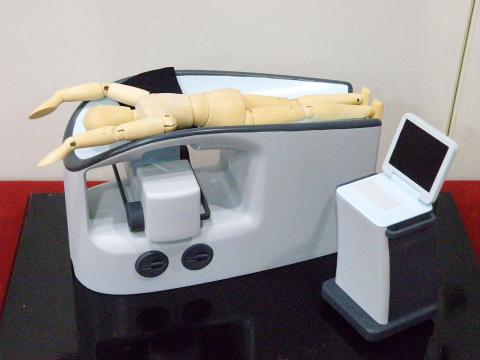The Institute of Nuclear Energy Research yesterday unveiled a new technique using positron emission tomography (PET) for more precise and comfortable scanning for breast cancer.
The institute said the first locally developed PET instrument solely dedicated to breast cancer screening possessed the advantages of accuracy, comfort and lower cost compared with current screening tools.
The device can be used to screen for preliminary breast cancer as well as to track following treatment for breast cancer.

Photo: Tang Chia-ling, Taipei Times
Breast cancer is the second-leading cause of death globally and the leading cause of death among Taiwanese women. The incidence of breast cancer in Taiwan is the second-highest in Asia, said Jan Meei-ling (詹美齡), a researcher at the institute.
CURRENT PROCESSES
Mammography is the currently recognized procedure for screening breast cancer in Taiwan, using low-energy X-rays to examine the breasts, said Tzen Kai-Yuan (曾凱元), director at National Taiwan University Hospital’s Department of Nuclear Medicine. If suspected masses are found, a cell or tissue sample is then taken for a biopsy, he said.
However, Asian women tend to have less fat in their breasts and higher breast density, making it more difficult to effectively screen breast cancer through mammography, which often leads to erroneous diagnoses, Jan said, adding that several women complained about the pain caused by mammography screening and feared having a biopsy.
SAFETY, AFFORDABILITY
Although the magnetic resonance imaging (MRI) technique or a conventional whole-body PET are sometimes used for improving diagnoses for breast cancer during second-phase screening, the cost of an MRI and the radiation dosage of traditional PETs are still relatively high compared with the newly developed breast PET, Jan said. Both tools also have lower accuracy, she said.
The institute said the new PET screening instrument would cost only one-fourth to one-sixth of an MRI and could reduce up to 70 percent of the radiation dose used in a conventional whole-body PET.
Moreover, a research study on breast PET in the US last year showed it could increase screening accuracy by 26 percent.
The institute estimated that more than 30,000 women in Taiwan would benefit from the new technology and avoid an unnecessary biopsy.
Thorough evaluations by the Department of Health and hospitals will be required before the device is employed in hospitals for regular use, Tzen said, adding that he estimated four or five years would be needed before it is adopted.
The institute said it was optimistic about the development of the new instrument, saying that all the components were made by local manufacturers and could have a positive impact on technological development.

‘DENIAL DEFENSE’: The US would increase its military presence with uncrewed ships, and submarines, while boosting defense in the Indo-Pacific, a Pete Hegseth memo said The US is reorienting its military strategy to focus primarily on deterring a potential Chinese invasion of Taiwan, a memo signed by US Secretary of Defense Pete Hegseth showed. The memo also called on Taiwan to increase its defense spending. The document, known as the “Interim National Defense Strategic Guidance,” was distributed this month and detailed the national defense plans of US President Donald Trump’s administration, an article in the Washington Post said on Saturday. It outlines how the US can prepare for a potential war with China and defend itself from threats in the “near abroad,” including Greenland and the Panama

A magnitude 4.9 earthquake struck off Tainan at 11:47am today, the Central Weather Administration (CWA) said. The hypocenter was 32.3km northeast of Tainan City Hall at a depth of 7.3km, CWA data showed. The intensity of the quake, which gauges the actual effect of a seismic event, measured 4 in Tainan and Chiayi County on Taiwan's seven-tier intensity scale, the data showed. The quake had an intensity of 3 in Chiayi City and County, and Yunlin County, while it was measured as 2 in Kaohsiung, Nantou County, Changhua County, Taitung County and offshore Penghu County, the data showed. There were no immediate reports of

The Chinese Nationalist Party (KMT) is maintaining close ties with Beijing, the Democratic Progressive Party (DPP) said yesterday, hours after a new round of Chinese military drills in the Taiwan Strait began. Political parties in a democracy have a responsibility to be loyal to the nation and defend its sovereignty, DPP spokesman Justin Wu (吳崢) told a news conference in Taipei. His comments came hours after Beijing announced via Chinese state media that the Chinese People’s Liberation Army’s Eastern Theater Command was holding large-scale drills simulating a multi-pronged attack on Taiwan. Contrary to the KMT’s claims that it is staunchly anti-communist, KMT Deputy

RESPONSE: The government would investigate incidents of Taiwanese entertainers in China promoting CCP propaganda online in contravention of the law, the source said Taiwanese entertainers living in China who are found to have contravened cross-strait regulations or collaborated with the Chinese Communist Party (CCP) could be subject to fines, a source said on Sunday. Several Taiwanese entertainers have posted on the social media platform Sina Weibo saying that Taiwan “must be returned” to China, and sharing news articles from Chinese state media. In response, the Mainland Affairs Council (MAC) has asked the Ministry of Culture to investigate whether the entertainers had contravened any laws, and asked for them to be questioned upon their return to Taiwan, an official familiar with the matter said. To curb repeated